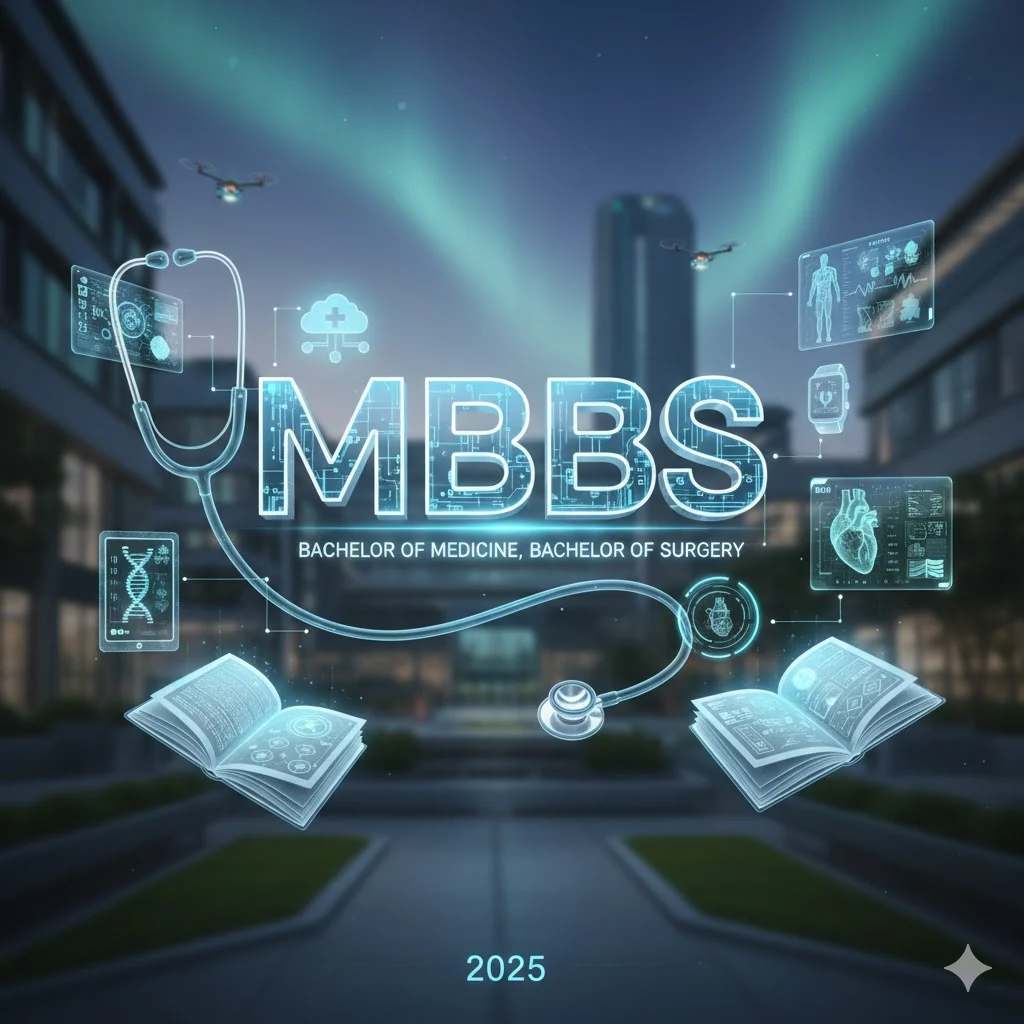If you’re wondering “MBBS full form” and what it really entails, this comprehensive guide has everything you need. MBBS remains the most prestigious undergraduate medical degree globally, laying the foundation for careers in medicine, surgery, research, and healthcare innovation.
In 2025, the field is rapidly evolving with AI, telemedicine, and emerging medical specialties.
What Is MBBS?
MBBS stands for Bachelor of Medicine, Bachelor of Surgery, a globally recognized undergraduate degree for medical practitioners. While the name suggests two degrees, it’s a single integrated program combining medicine and surgery.
Key Features:
- Degree Level: Undergraduate professional degree
- Duration: 5.5–6 years including internship
- Curriculum: Integrates theoretical knowledge, clinical skills, and practical patient care
- Global Recognition: Accepted in over 100 countries
MBBS is the gateway to practicing medicine, pursuing advanced specializations, or entering medical research and public health fields.
MBBS Full Form Explained
| Acronym | Full Form |
|---|---|
| MBBS | Bachelor of Medicine, Bachelor of Surgery |
The MBBS curriculum is designed to train students to diagnose, treat, and manage diseases while developing surgical skills, communication abilities, and ethical decision-making.
Eligibility Criteria for MBBS in 2025
To pursue MBBS, candidates must fulfill strict eligibility criteria:
- Academic Requirements: Completion of 12th grade with Physics, Chemistry, and Biology.
- Minimum Marks: 50–60% in science subjects for general category; higher for top institutions.
- Entrance Exams: Required tests include NEET (India), PMDC (Pakistan), or university-specific exams.
- Age Limit: Typically 17–25 years; exceptions for mature students exist in some countries.
- Language Proficiency: For international students, English proficiency tests like IELTS or TOEFL may be required.
2025 Update: Many universities now consider AI-assisted aptitude assessments for admissions to evaluate problem-solving and critical thinking.
MBBS Course Duration and Structure
The MBBS course spans 5.5–6 years, including one-year internship. The curriculum is divided into pre-clinical, para-clinical, and clinical stages:
| Year | Subjects / Focus Areas | 2025 Innovations |
|---|---|---|
| 1st Year | Anatomy, Physiology, Biochemistry | 3D virtual dissection labs |
| 2nd Year | Pathology, Microbiology, Pharmacology | AI-assisted diagnostics workshops |
| 3rd Year | Medicine, Surgery, Obstetrics & Gynecology | Robotics in surgery simulation |
| 4th Year | Pediatrics, ENT, Ophthalmology, Community Medicine | Telemedicine rotations, public health analytics |
| 5th Year | Clinical Rotations & Internship | Hands-on hospital experience, AI patient monitoring systems |
Internship Highlight 2025: Interns now work in digital health units and telemedicine clinics, preparing them for modern medical careers.
MBBS Specializations and Career Pathways
MBBS opens diverse career options. In 2025, emerging fields are creating new opportunities:
Traditional Career Paths:
- General Physician: Treats patients in hospitals, clinics, and private practice.
- Surgeon: Orthopedics, neurosurgery, cardiothoracic, or general surgery.
- Pediatrics: Child healthcare specialist.
- Gynecology & Obstetrics: Women’s health and maternal care.
Advanced & Emerging Fields (2025):
- Telemedicine & Digital Health: Remote patient consultations, health data analytics.
- Robotic Surgery Specialist: Minimally invasive surgery using robotic systems.
- Medical AI & Diagnostics: Using AI to assist in radiology, pathology, and predictive healthcare.
- Global Health & Epidemiology: Work with WHO, CDC, or NGOs to manage global health crises.
- Pharmaceutical Research & Biotech: Drug development, clinical trials, and biotechnology innovation.
Academic & Teaching Opportunities:
- Lecturer or professor in medical colleges
- Research roles in universities or private labs
- Medical content development for online education
Pro Tip: MBBS graduates who combine clinical skills with digital health expertise are in highest demand in 2025.
MBBS vs Other Medical Degrees
| Degree | Duration | Focus | Future Scope |
|---|---|---|---|
| MBBS | 5–6 years | Medicine & Surgery | Global medical practice, specialization, research |
| BDS | 4–5 years | Dentistry | Dental surgery, orthodontics |
| BPT | 4 years | Physiotherapy | Rehabilitation, sports medicine |
| BHMS | 5.5 years | Homeopathy | Alternative medicine practice |
| BAMS | 5.5 years | Ayurveda | Traditional medicine, holistic healthcare |
MBBS offers the broadest scope, with international recognition and flexible career options.
MBBS Admission Process in 2025
The modern admission process combines traditional exams with tech-driven assessments:
- Online Application Submission: Digital portals for most universities.
- Entrance Examination: NEET, PMDC, or university-level AI-assisted exams.
- Merit List & Counseling: Automated ranking with transparent results.
- Document Verification: Academic records, identification, and medical clearance.
- Enrollment & Orientation: Hybrid onboarding with virtual modules and hospital tours.
2025 Trend: Some universities offer scholarships for AI and digital health innovation projects during MBBS.
Top MBBS Colleges & Universities (2025)
| Rank | College / University | Country | Notable 2025 Updates |
|---|---|---|---|
| 1 | AIIMS (All India Institute of Medical Sciences) | India | AI-assisted clinical training |
| 2 | King Edward Medical University | Pakistan | Telemedicine lab rotations |
| 3 | Harvard Medical School | USA | Advanced robotics and AI in surgery courses |
| 4 | University of Oxford Medical School | UK | Global health internships with WHO |
| 5 | Stanford University School of Medicine | USA | Digital health innovation projects |
MBBS Salary in 2025
| Country | Average Annual Salary | Notes |
|---|---|---|
| India | ₹6–12 Lakh | Higher in metro cities and private hospitals |
| Pakistan | PKR 900,000–1,800,000 | Specialized surgeons earn more |
| USA | $75,000–$160,000 | Interns: $70,000; Specialists: $200,000+ |
| UK | £32,000–£55,000 | Junior doctors: £32k; consultants: £120k+ |
Salary Insight 2025: AI, telemedicine, and specialized surgical expertise increase earning potential significantly.
Advantages of MBBS
- Global Demand: Doctors are needed worldwide.
- Prestige: One of the most respected degrees globally.
- Diverse Careers: Medicine, surgery, research, public health, digital health.
- Impactful Work: Direct contribution to patient care and society.
- Future-Ready: Opportunities in AI, telemedicine, robotics, and global healthcare.
Challenges of MBBS
- Long Duration: 5–6 years plus internship.
- High Competition: Entrance exams are tough; merit lists are competitive.
- Stressful Curriculum: Heavy syllabus and practical exposure.
- Financial Costs: Private colleges can be expensive.
- Responsibility: High accountability for patient care.
FAQs About MBBS
1. What is MBBS full form?
Answer: Bachelor of Medicine, Bachelor of Surgery.
2. How long is the MBBS course in 2025?
5.5–6 years including internship.
3. Can I pursue MBBS abroad?
Yes, popular countries include the USA, UK, China, Russia, and the Philippines.
4. What is the average MBBS salary in 2025?
₹6–12 Lakh in India; $75,000–$160,000 in the USA.
5. What are emerging MBBS career fields?
Telemedicine, AI diagnostics, robotic surgery, and global health.
6. Are entrance exams mandatory?
Yes, exams like NEET, PMDC, or institution-specific tests are required.
7. Can MBBS graduates specialize?
Yes, in fields like cardiology, dermatology, oncology, or surgery.
8. What skills are essential for MBBS in 2025?
Clinical skills, problem-solving, AI literacy, communication, and empathy.
9. Is MBBS difficult?
Yes, but consistent study, hands-on practice, and mentorship help succeed.
10. What is the international recognition of MBBS?
MBBS degrees are accepted in over 100 countries, though licensing exams may be required.
SEO Tip: Use FAQ schema for these 10 FAQs to enhance Google visibility.
Conclusion
The MBBS full form is not just a degree—it’s a gateway to a dynamic, future-ready medical career. In 2025, MBBS graduates can combine traditional medicine with emerging technologies like AI, telemedicine, and robotic surgery to make a global impact.
Whether your goal is to become a physician, surgeon, medical researcher, or public health innovator, MBBS provides the foundation, skills, and opportunities to thrive in a rapidly evolving healthcare landscape.



